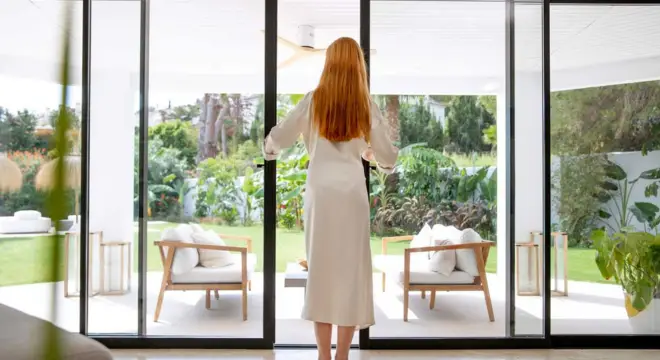Declutter Your Bedroom Fast: 14 Things You Shouldn’t Be Sleeping Next To
I didn’t realize how much my bedroom was messing with my sleep—until I started getting rid of things.
Not adding new stuff. Not rearranging. Just tossing out what didn’t belong.
We treat our bedrooms like storage closets, piling up clothes, cords, unread books, expired lotions, and a hundred “just-in-case” things. But when you sleep in a space that feels like a to-do list, your brain doesn’t switch off. Mine didn’t either.
If you wake up tired, anxious, or groggy, it’s not always about your diet or screen time. Sometimes, it’s your physical space silently stressing you out. The good news? You don’t need to be a minimalist or spend hours organizing. You just need to start removing the right things.
In this guide, I’ll walk you through 14 common bedroom items to toss right now—backed by expert advice, real stories, and a little tough love. Because your bedroom should help you rest, not remind you of everything that’s undone.
Let’s start with what needs to go.
1. Old Pillows (Especially the Ones You Don’t Use)
We keep extra pillows like we’re running a guest house. Lumpy, flat, or stained ones that haven’t been touched in months? They’re not helping anyone. In fact, they collect dust mites, sweat, skin cells, and allergens over time—stuff you probably don’t want near your face every night.
Sleep experts recommend replacing pillows every 1–2 years, especially if you suffer from allergies or wake up with neck stiffness. But even if they’re “technically fine,” old pillows just take up space and often signal clutter more than comfort.
A cleaner bed means fewer distractions, less dust, and better sleep overall. It also signals to your brain that this space is for rest—not storage.
Pillow hygiene directly impacts sleep quality, and old bedding can actually disrupt your ability to fall asleep and stay asleep.
2. Visible Clutter on Surfaces (Nightstands, Dressers, Desks)
Look around your bedroom. What’s on top of your nightstand or dresser? Half-used candles, tangled jewelry, unopened mail, empty water bottles? These little things may seem harmless, but they quietly build up mental tension. Every object is a visual task—something your brain has to process.
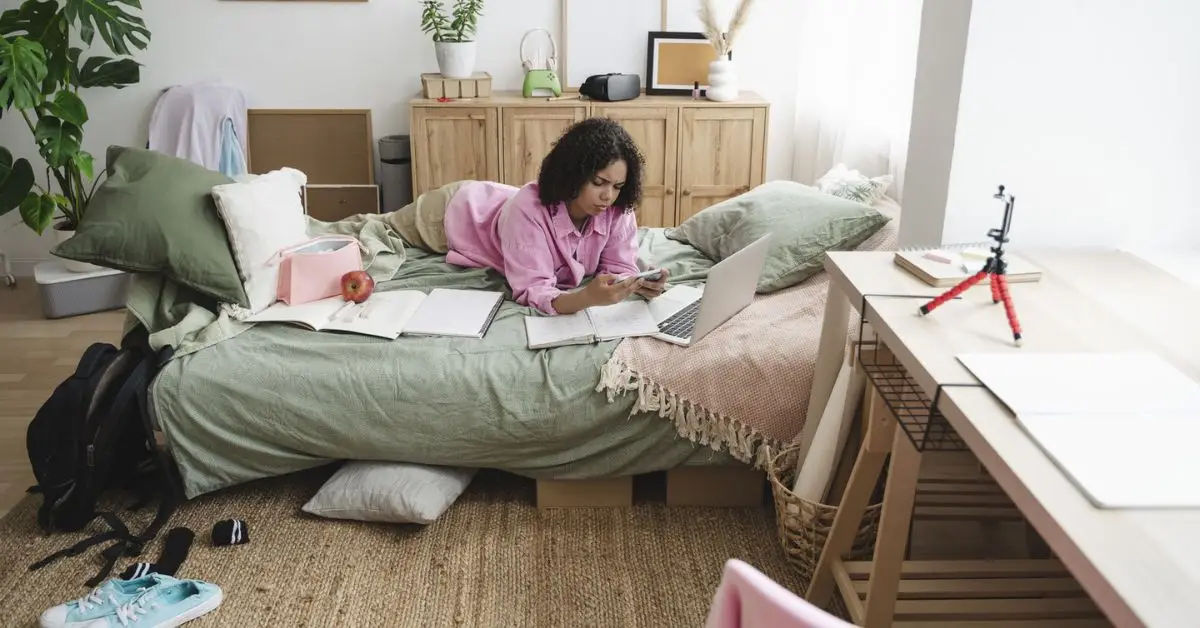
Research from mental health experts shows that clutter increases cortisol (your stress hormone), which directly affects your ability to relax and fall asleep.
Less on your surfaces means more calm in your head. It’s not about perfection. It’s about breathing room.
3. Screens and Chargers That Don’t Belong in Bed
We all do it—scroll Instagram before sleep, check emails in bed, or keep our phones charging right next to our pillow. But the blue light from screens can delay melatonin release and mess with your sleep cycle. Even when you’re not using them, having screens within arm’s reach keeps your brain on alert.
Blue light exposure at night not only reduces melatonin but shifts your circadian rhythm—making it harder to fall asleep and wake up refreshed.
If you can’t ditch the phone entirely, at least move it across the room. Better yet, replace your bedtime scroll with something quiet and offline. You don’t need to earn your rest by checking one more notification.
4. Clothes You Don’t Wear but Can’t Seem to Let Go
That “maybe someday” dress. The jeans that haven’t fit since college. The shirt you wore once to an awkward event. We keep these items for emotional reasons—regret, guilt, nostalgia—but they take up mental and physical space.
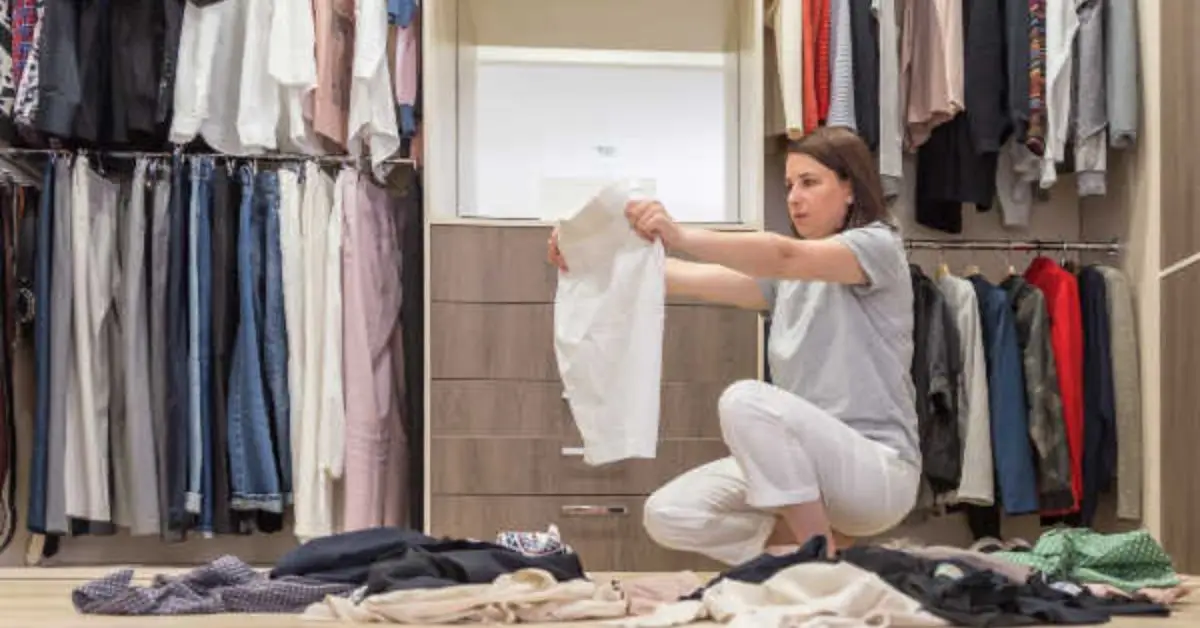
Here’s the truth: if it makes you feel bad, it doesn’t belong where you sleep. Your bedroom should be a soft landing, not a reminder of who you used to be or wish you were.
Start with one drawer. Let go of anything that makes you sigh when you see it. You’re not just creating closet space—you’re letting go of quiet, daily stress.
5. Worn-Out Towels, Sheets, and Linens
If your bed sheets are faded, pilled, or stretched thin from years of washing, they’re not just uncomfortable—they’re also quietly dragging down the feel of your entire room. Same goes for frayed towels stuffed into drawers or hanging behind doors.
Old linens make your space feel tired, even when it’s technically clean.
Replacing sheets every 1–2 years and tossing worn-out towels that no longer absorb well. Not because of trends or aesthetics, but because fresh bedding genuinely improves your sleep experience.
You don’t need fancy hotel sheets. But you do deserve something that feels restful when you slide into bed.
6. Decorative Knick-Knacks That Collect Dust
A few personal touches are fine—a photo frame, a small lamp, maybe a candle. But when your bedroom starts looking like a souvenir shelf or decor showroom, it becomes noisy.
Worse, many of these items trap dust and synthetic fragrance—both of which affect air quality and trigger allergies.
A sleep doctor warning against synthetic room sprays, layered decor, and plastic-surfaced items, noting they can disrupt breathing and worsen sleep issues.
Take a second look at what’s sitting on your shelves. If it doesn’t make you feel calmer, or you don’t even notice it anymore, it’s probably time to let it go.
7. Half-Used Products and Toiletries
Lotions, perfumes, essential oils, face masks—you name it. They pile up quickly, especially if your bedroom doubles as a vanity. But most of these products have expiration dates, or simply lose potency over time. And let’s be honest: you’re not using that lavender body spray from 2018 again.
Expired or half-used items create decision fatigue. They’re visual clutter and often literal waste.
Keeping too many chemical-heavy products in your sleeping space can also affect air quality and sleep hormones.
Keep what you actually use. Move the rest out—or toss it. You’ll breathe easier. Literally.
8. Storage Bins You Haven’t Opened in Months
You know the ones—under the bed, in the corner, maybe stacked by the closet. You haven’t touched them in months, but somehow they’re still “important.” If you need to dig through storage just to remember what’s inside, chances are it’s not adding real value to your life.
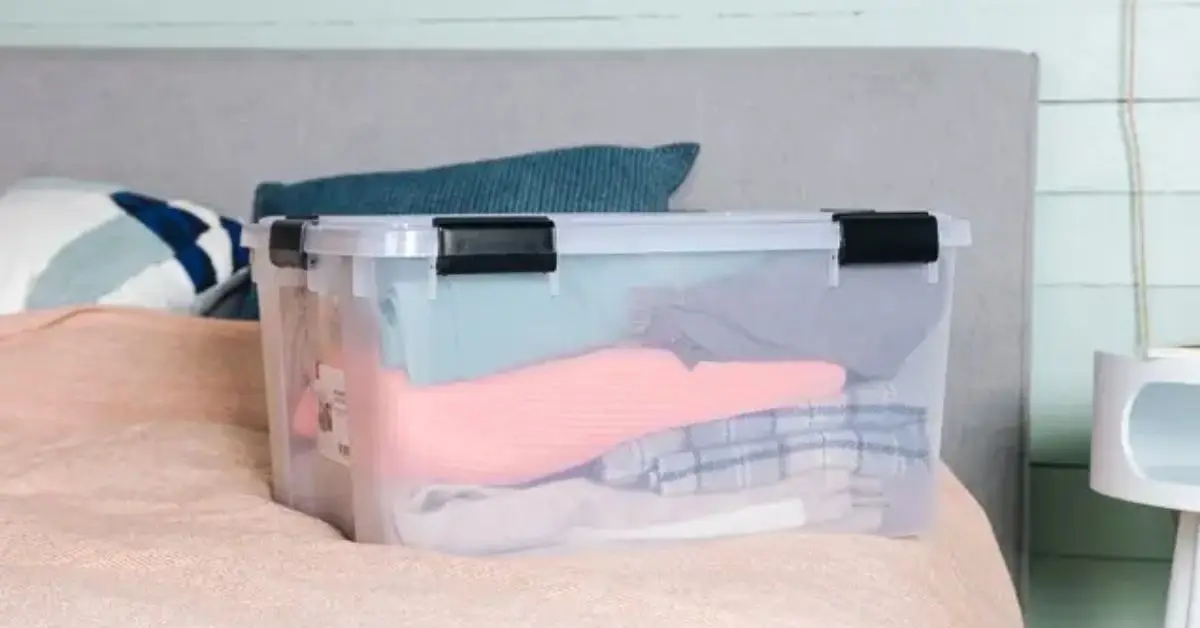
Out-of-sight clutter is still clutter. Even closed, these bins signal unfinished business and create visual weight in the room.
Simplicity & Sunshine points out that “delayed decisions” often show up as stored stuff we never revisit. And bedrooms are the worst place to carry that mental weight.
Revisit those bins. If they’re full of “just in case” or “maybe later” items, ask yourself: When was the last time I needed this? If you can’t answer, you already have your answer.
9. Random Paper Piles, Notes, Books You’re Not Reading
Bills, to-do lists, receipts, notebooks from old jobs—these often sneak into the bedroom and never leave. Even if they’re stacked neatly, they remind your brain of work, deadlines, and unfinished tasks. Not exactly restful vibes.
One Reddit user shared how simply clearing a pile of paper from their nightstand noticeably reduced their anxiety at bedtime.
If you’re not actively reading that book or using that journal, move it. And consider making your bedroom a paper-free zone altogether. It’s one of the simplest ways to reclaim peace.
10. Duplicate Chargers, Cables, and Tech You Don’t Use
Most of us have at least one drawer or box filled with tangled cords, mystery adapters, dead headphones, and maybe an old Kindle you forgot was there. We keep them “just in case” but rarely, if ever, need them again.
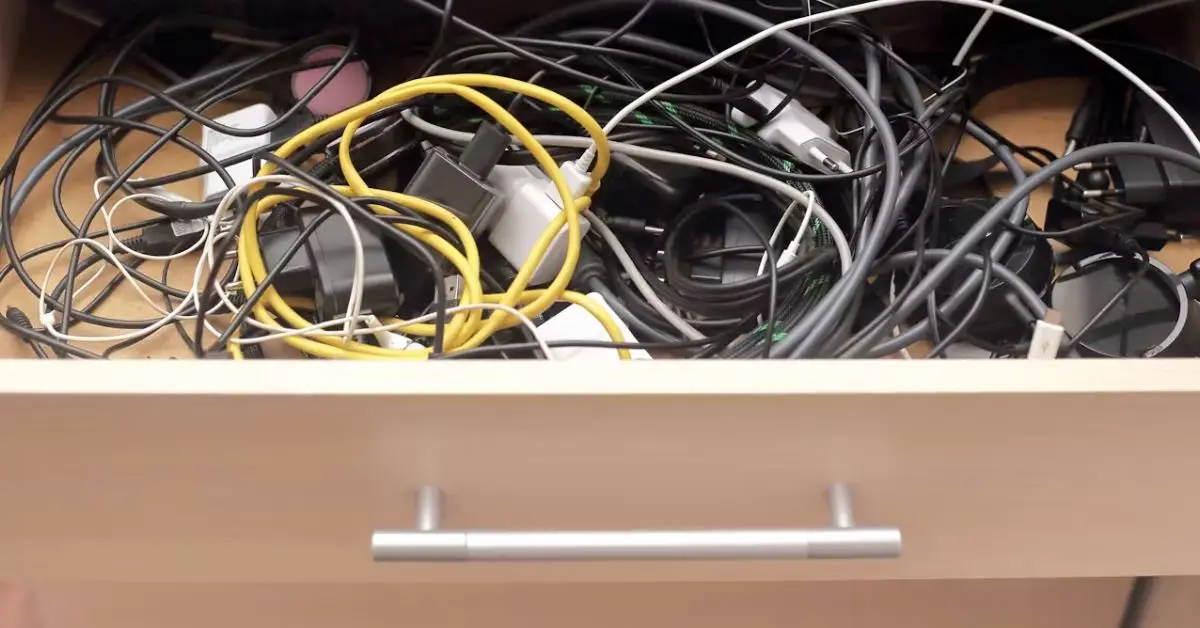
Extra cords and unused tech quietly take up space and encourage you to stay plugged in longer. Not to mention they often end up collecting dust and cluttering surfaces.
Instead of hoarding spares, keep one reliable charger in your bedroom—and move the rest to a dedicated tech box outside. Your brain doesn’t need more wires and screens in your sleep zone.
11. Broken Items You’ve Been Meaning to Fix
That lamp with the wobbly switch. The drawer knob that came off. The wall clock that stopped working months ago. Broken things quietly signal “unfinished” to your brain—even when you’ve gotten used to them.
Every time you see them, your brain registers a tiny task left undone. It builds background noise you don’t consciously notice but definitely feel.
According to The Spruce, broken or non-functional items are classic energy drainers, especially in spaces meant for restoration like your bedroom.
If you haven’t fixed it yet, either do it today or get rid of it. You don’t need reminders of delayed chores in your sleep space.
12. Gifts or Sentimental Items That Make You Feel Guilty
That framed quote from an ex-friend. A family gift you never liked. An old souvenir from a trip you’d rather forget. These things live in your bedroom because they’re “personal,” but they often carry complicated emotions.
You’re allowed to respect the memory and still let the object go.
Declutter in Minutes explains how guilt clutter—items we keep out of obligation—takes up more emotional space than physical. And the bedroom is the worst place to store that kind of weight.
Your sleep space should reflect who you are now, not who you feel pressured to be.
13. Work-Related Materials or Office Supplies
Even if you’re WFH, your bedroom should never double as a full-time office. Notebooks, laptops, stacks of documents—these things keep your brain in work mode even after you log off.
Your bedroom environment needs to signal rest, not productivity. Otherwise, your brain struggles to disconnect, leading to shallow or interrupted sleep.
If your bedroom is your only workspace, create a visual boundary. Use a screen, a basket, or a closed cabinet. At the very least, clear the desk before bed. You deserve mental closure each night.
14. Anything That Doesn’t Serve Rest, Romance, or Recovery
This is your final filter. Look at every item in your bedroom and ask: Does this help me sleep, relax, or feel safe?
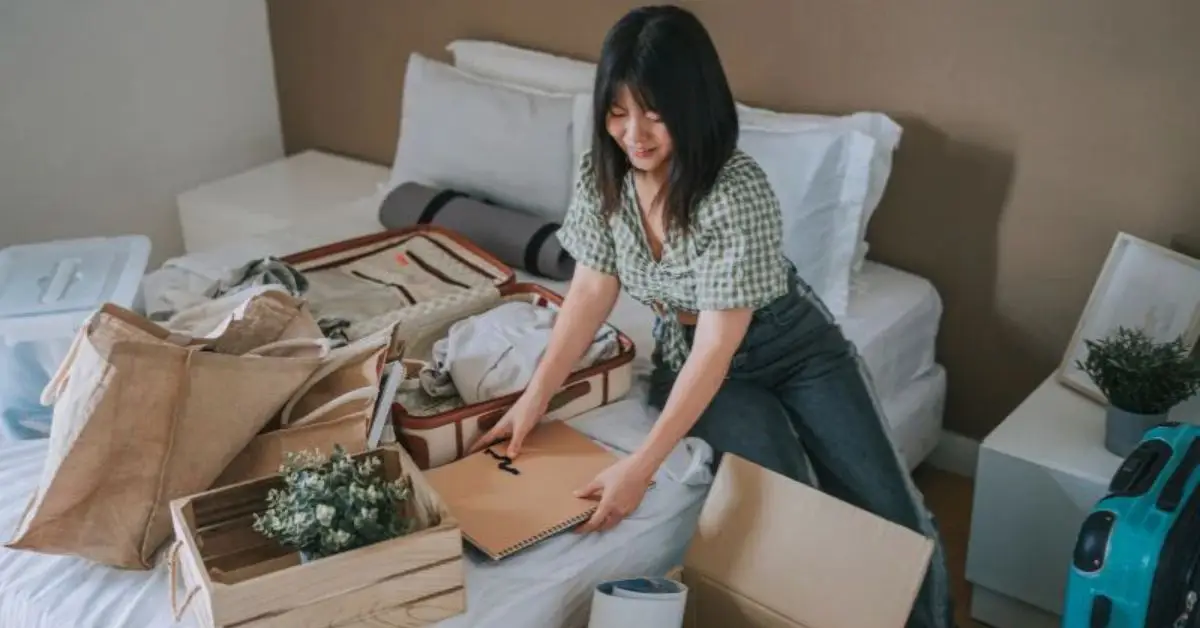
If it doesn’t fit into those categories—rest, romance, recovery—it probably belongs elsewhere. Your bedroom isn’t a dumping ground for what doesn’t fit in the rest of the house. It’s the one place that should give more than it takes.
Minimalism isn’t the goal. Functionality is.
“Creating a peaceful bedroom starts with clearing out what doesn’t belong—so the things that do can finally stand out.”
How to Declutter Quickly Without Overwhelm
If the idea of tackling your entire bedroom feels too big, you’re not alone. Most people give up before they even begin—not because they’re lazy, but because they’re overwhelmed. That’s why speed and structure matter.
Start small. Focus on momentum, not perfection. Here are a few tried-and-true methods that actually work:
- The 10-minute timer trick: Set a timer and commit to decluttering just one drawer or one surface. You’ll often end up doing more once you start.
- The Four-Box Method: Label four boxes—Keep, Toss, Donate, Not Sure. Having options reduces decision fatigue.
- Zone-by-zone breakdown: Split your room into mini zones (bedside table, floor, under-bed, dresser top) and handle one at a time. If you’re ready to go beyond the bedroom, here’s a simple room-by-room decluttering guide that breaks the whole house into easy 10-minute wins.
- One-touch rule: If you pick something up, decide right then—don’t put it back “for now.”
After the Toss — Keeping It Clutter-Free
Decluttering is the first step. The harder part? Keeping it that way. But if you build in tiny habits, staying organized becomes almost automatic.
Here’s what actually works:
- Make your bed every day – It’s small, but it sets the tone for order. You can also try these quick morning decluttering habits minimalists swear by to keep your space effortlessly tidy.
- Use trays and small containers – Especially for jewelry, keys, chargers, or skincare. Containment creates visual calm.
- Keep a “donation bag” in the closet – Drop items in it whenever something feels unnecessary. Empty monthly.
- Test containers before you buy more – Often, the solution isn’t more bins. It’s less stuff.
Final Thoughts
Decluttering isn’t a race. It’s not about becoming a minimalist or tossing everything you own. It’s about creating a space that helps you feel calmer, sleep better, and think more clearly. Even tricky spaces like the attic can be tackled with a little creativity—these smart attic decluttering tips are perfect if you’re ready for a summer reset.
Go at your own pace. If one item feels too hard to let go of, skip it for now. Progress is personal.
And if you’re dealing with chronic disorganization, hoarding tendencies, or medical conditions like dust allergies or sensory sensitivity, consider speaking with a professional. Your health and comfort come first—always.
The goal isn’t to have a Pinterest-perfect room. The goal is to feel like your bedroom supports your life—not silently weighs you down.
Want more practical tips to simplify your home and sleep better? Visit Build Like New for guides that actually work—no fluff, just real-life results.
Disclaimer: This article is for informational purposes only. Always consult a professional if you’re dealing with medical conditions, mental health challenges, or hoarding-related issues.


